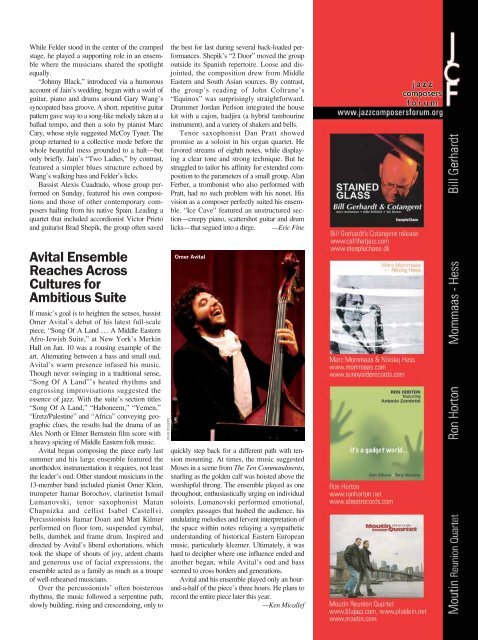You also want an ePaper? Increase the reach of your titles
YUMPU automatically turns print PDFs into web optimized ePapers that Google loves.
While Felder stood in the center of the cramped<br />
stage, he played a supporting role in an ensemble<br />
where the musicians shared the spotlight<br />
equally.<br />
“Johnny Black,” introduced via a humorous<br />
account of Jain’s wedding, began with a swirl of<br />
guitar, piano and drums around Gary Wang’s<br />
syncopated bass groove. A short, repetitive guitar<br />
pattern gave way to a song-like melody taken at a<br />
ballad tempo, and then a solo by pianist Marc<br />
Cary, whose style suggested McCoy Tyner. The<br />
group returned to a collective mode before the<br />
whole beautiful mess grounded to a halt—but<br />
only briefly. Jain’s “Two Ladies,” by contrast,<br />
featured a simpler blues structure echoed by<br />
Wang’s walking bass and Felder’s licks.<br />
Bassist Alexis Cuadrado, whose group performed<br />
on Sunday, featured his own compositions<br />
and those of other contemporary composers<br />
hailing from his native Spain. Leading a<br />
quartet that included accordionist Victor Prieto<br />
and guitarist Brad Shepik, the group often saved<br />
Avital Ensemble<br />
Reaches Across<br />
Cultures for<br />
Ambitious Suite<br />
If music’s goal is to heighten the senses, bassist<br />
Omer Avital’s debut of his latest full-scale<br />
piece, “Song Of A Land … A Middle Eastern<br />
Afro-Jewish Suite,” at New York’s Merkin<br />
Hall on Jan. 10 was a rousing example of the<br />
art. Alternating between a bass and small oud,<br />
Avital’s warm presence infused his music.<br />
Though never swinging in a traditional sense,<br />
“Song Of A Land”’s heated rhythms and<br />
engrossing improvisations suggested the<br />
essence of jazz. With the suite’s section titles<br />
“Song Of A Land,” “Haboneem,” “Yemen,”<br />
“Eretz/Palestine” and “Africa” conveying geographic<br />
clues, the results had the drama of an<br />
Alex North or Elmer Bernstein film score with<br />
a heavy spicing of Middle Eastern folk music.<br />
Avital began composing the piece early last<br />
summer and his large ensemble featured the<br />
unorthodox instrumentation it requires, not least<br />
the leader’s oud. Other standout musicians in the<br />
13-member band included pianist Omer Klein,<br />
trumpeter Itamar Borochov, clarinetist Ismail<br />
Lumanovski, tenor saxophonist Matan<br />
Chapnizka and cellist Isabel Castellvi.<br />
Percussionists Itamar Doari and Matt Kilmer<br />
performed on floor tom, suspended cymbal,<br />
bells, dumbek and frame drum. Inspired and<br />
directed by Avital’s liberal exhortations, which<br />
took the shape of shouts of joy, ardent chants<br />
and generous use of facial expressions, the<br />
ensemble acted as a family as much as a troupe<br />
of well-rehearsed musicians.<br />
Over the percussionists’ often boisterous<br />
rhythms, the music followed a serpentine path,<br />
slowly building, rising and crescendoing, only to<br />
JOHN ROGERS<br />
the best for last during several back-loaded performances.<br />
Shepik’s “2 Door” moved the group<br />
outside its Spanish repertoire. Loose and disjointed,<br />
the composition drew from Middle<br />
Eastern and South Asian sources. By contrast,<br />
the group’s reading of John Coltrane’s<br />
“Equinox” was surprisingly straightforward.<br />
Drummer Jordan Perlson integrated the house<br />
kit with a cajon, hadjira (a hybrid tambourine<br />
instrument), and a variety of shakers and bells.<br />
Tenor saxophonist Dan Pratt showed<br />
promise as a soloist in his organ quartet. He<br />
favored streams of eighth notes, while displaying<br />
a clear tone and strong technique. But he<br />
struggled to tailor his affinity for extended composition<br />
to the parameters of a small group. Alan<br />
Ferber, a trombonist who also performed with<br />
Pratt, had no such problem with his nonet. His<br />
vision as a composer perfectly suited his ensemble.<br />
“Ice Cave” featured an unstructured section—creepy<br />
piano, scattershot guitar and drum<br />
licks—that segued into a dirge. —Eric Fine<br />
Omer Avital<br />
quickly step back for a different path with tension<br />
mounting. At times, the music suggested<br />
Moses in a scene from The Ten Commandments,<br />
snarling as the golden calf was hoisted above the<br />
worshipful throng. The ensemble played as one<br />
throughout, enthusiastically urging on individual<br />
soloists. Lumanovski performed emotional,<br />
complex passages that hushed the audience, his<br />
undulating melodies and fervent interpretation of<br />
the space within notes relaying a sympathetic<br />
understanding of historical Eastern European<br />
music, particularly klezmer. Ultimately, it was<br />
hard to decipher where one influence ended and<br />
another began, while Avital’s oud and bass<br />
seemed to cross borders and generations.<br />
Avital and his ensemble played only an hourand-a-half<br />
of the piece’s three hours. He plans to<br />
record the entire piece later this year.<br />
—Ken Micallef

















